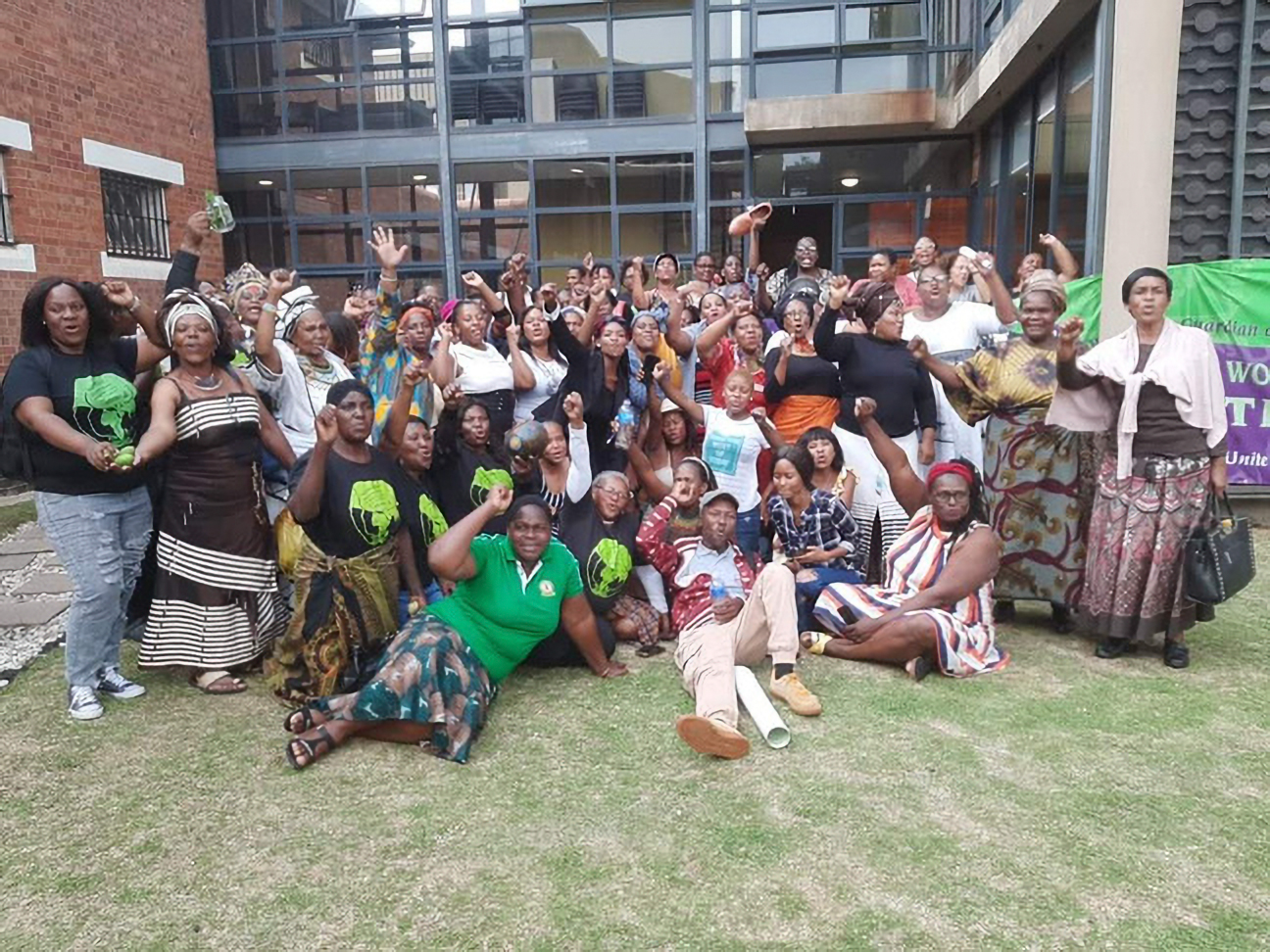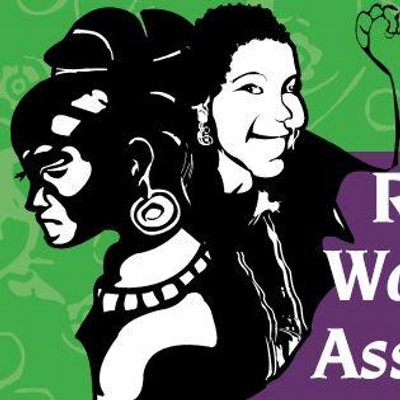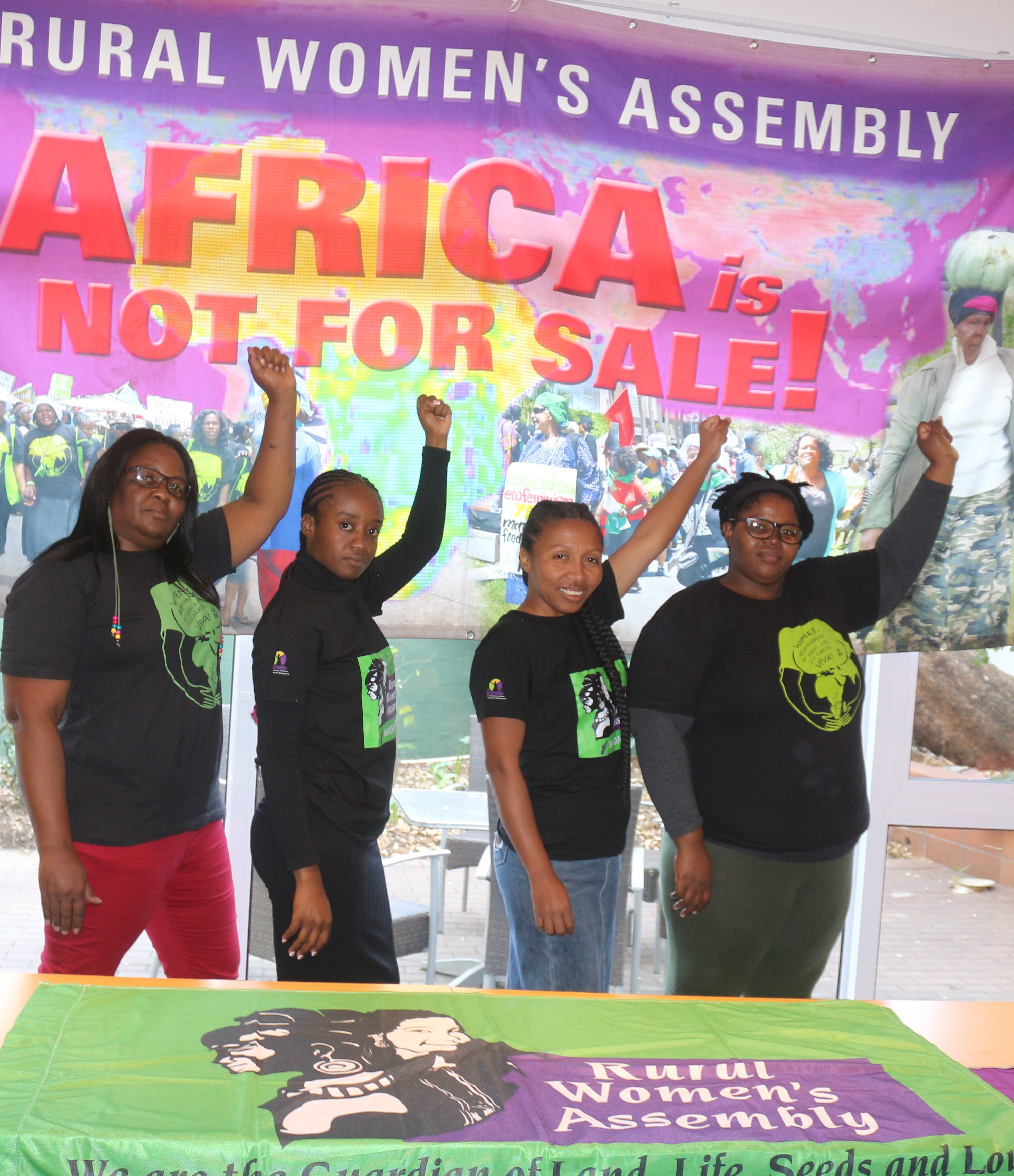
Voices from the South Newsletter

Namasiku Muyoba, Lungisa Huna, Mercia Andrews
RWA Southern Africa
The Rural Women’s Assembly (RWA) is a self-organized network of national rural women’s movements, assemblies, grassroots organizations and chapters of mixed peasant unions, federations and movements across 10 countries in southern Africa.
We reflect on the challenges that hinder Africa’s progress towards an integrated, prosperous, and peaceful continent.
Despite the achievements of the African Union, Africa continues to grapple with issues such as poverty, gender based violence, hunger, conflicts, climate change, corruption, and neo-colonialism. Rural women, the backbone of Africa’s agricultural sector, face marginalisation, violence, and limited access to resources.
Africa’s sovereignty and natural resources must be safeguarded, and responsible management and equitable distribution of wealth should be prioritised. Leaders should promote sustainable agricultural practices, secure food sovereignty, and foster fair partnerships.
Africa is not for sale! It is time for visionary, ethical leadership to uplift the continent and its people.
Gender-Based Violence (GBV), in particular, is a pervasive issue in Southern Africa that perpetuates inequality, fear, and injustice. At the heart of this crisis lies the poisonous grip of patriarchal norms that suffocate progress and maintain the status quo. A deeply entrenched system of male dominance perpetuates the idea that women are second-class citizens, mere possessions to be controlled and subjugated. This toxic mindset infiltrates every aspect of society, from homes and workplaces to political institutions and religious establishments, allowing GBV to flourish under the guise of tradition and cultural norms.
Deep-rooted gender inequalities, harmful traditional practices, and the failure of systems and institutions also contribute to the prevalence of GBV. To address this crisis, radical and transformative measures are necessary.
In times of crisis, be it a climate disaster, political upheaval, or a global pandemic, sister solidarity emerges as a radical force that transcends boundaries, unites women across diverse backgrounds, and ignites a transformative power. When the world seems to unravel, it is the unwavering support, compassion, and resilience among women that serve as the foundation for survival and progress.
Sister solidarity is an act of resistance and rejecting patriarchal narratives that often intensify during crises, seeking to reinforce traditional gender roles and further marginalise women. Together, we challenge the notion that women are passive victims and demonstrate our inherent capacity for leadership, problem-solving, and resilience.
By standing in solidarity, we refuse to be silenced, invisible, or dismissed. In commemoration of Africa Day we released a press statement speaking to the current state of Africa – found below.

Sister solidarity is an act of resistance and rejecting patriarchal narratives that often intensify during crises, seeking to reinforce traditional gender roles and further marginalise women.
RWA demands radical leadership from the African Union and African Governments
Press statement from the Rural Womens’ Assembly
On this Africa Day, the annual commemoration of the founding of the African Union (AU), we take time to reflect on the state of Africa and speak to the pressing issues that hinder its progress towards an integrated, prosperous, and peaceful Africa as envisioned by the African Union by 2063.
While recognising the achievements of the African Union in its 60th year of existence, we must acknowledge the lingering legacies of colonialism and inequality, that continue to hinder Africa’s development. Instead of African countries being able to celebrate “sovereignty, territorial integrity“ on African day, the continent is riddled with poverty and high hunger continues to haunt Africa given that food systems have collapsed. In addition, it is tragic to witness the ongoing conflicts and violence that destabilise our nations, eroding the path towards peace and stability.
Instead of celebrating, we continue to mourn the dearth of visionary, ethical leaders and the lack of vibrant democracies and strong economies on the continent. African leaders exist in corrupt and dictatorial regimes that undermine the principles of democracy and good governance. Africa’s rich mineral and natural resources should be a source of prosperity and shared benefit for its people.
However, mismanagement and unchecked exploitation have left many African nations burdened with excessive debt, robbing their citizens of the wealth they rightfully deserve. Instead of a ‘peaceful Africa” we are witnessing more militarisation and war economies which advance the interests of a reprehensible elite. We cannot ignore the damaging impact of neo-colonialism on our continent. Multinational corporations and commercial interests continue to exploit Africa’s resources, causing irreversible environmental damage. The AU has been useless in protecting the continent’s sovereignty and on the AU’s watch, this rampant neo-colonialism is only getting worse.
Rural women are the backbone of Africa’s agricultural sector, playing a pivotal role in ensuring food security, sustainable development, and the overall well-being of their communities. Yet, they remain trapped in a cycle of poverty, inequality, and limited access to resources, opportunities, and basic services. Rural women are subject to deplorable violence, suffering and dying often in silence with the global media rendering them all but invisible and the AU paralysed with inaction. This unjust reality perpetuates a vicious cycle of disadvantage and hampers the progress of rural communities.
Africa Day should serve as a powerful reminder that the liberation of our continent cannot be achieved without empowering rural women. We call to action for governments and the African Union to prioritise the rights and needs of rural women, address the root causes of their marginalisation, and provide them with the necessary support to thrive.
Africa Day should serve as a powerful reminder that the liberation of our continent cannot be achieved without empowering rural women. We call to action for governments and the African Union to prioritise the rights and needs of rural women, address the root causes of their marginalisation, and provide them with the necessary support to thrive.
The African Union must take decisive action to safeguard Africa’s sovereignty, protecting its natural heritage and ensuring fair and sustainable practices that benefit both Africans and the global community. The looting of Africa’s resources, facilitated by corrupt leaders, exacerbates mass migration, displacement, and violence, particularly affecting vulnerable groups more especially women. The Africa Union’s response to the climate crisis has been insufficient, leaving rural communities vulnerable and without necessary support. We call for a stronger stance against climate injustice, holding polluters accountable and providing assistance to affected communities in rebuilding their lives and livelihoods.
RWA Southern Africa is not calling for women to lead in a vacuum, but within a context of healthy democracies. We are calling for leaders that work to rebuild the continent’s economies, safeguard our sovereignty and natural wealth, food systems and can organise around common interests which emulates the Bandung declaration, which calls for solidarity among nations and a rejection of exploitative relationships. Instead of responsible control and management of resources and equitable distribution of wealth to uplift communities and address systemic poverty, our leaders allow Transnational Corporations (TNCs) to plunder and destroy our environment!
We say Africa is not for sale. We demand leaders who prioritise the well-being and safety of all citizens, especially that citizens have to bear the brunt of such exploitation. We advocate for the promotion of sustainable agricultural practices such as agroecology, empowering African farmers and securing food sovereignty.
The Africa Union must champion the growth of local markets, ensuring African farmers’ independence and promoting diverse and nutritious diets for our people. We appeal to leaders to counter the extractive nature of our engagements with the global north, promoting mutual respect and fair partnerships that benefit all Africans and protect our heritage.
